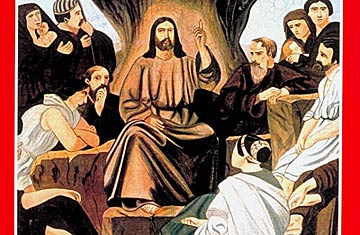
(10 of 11)
In the New World, a personal, biblical faith was an American characteristic from the start. The early settlers' fervor was reactivated in the 18th century by Jonathan Edwards and Anglican George Whitefield, America's first mass revivalist. When Whitefield hit Philadelphia in 1739, Freethinker Ben Franklin figured his open-air congregation at 30,000 and marveled: "It was wonderful to see the change soon made in the manners of our inhabitants. It seemed as if all the world were growing religious." But the social consequences of religious zeal were more dramatic during the "Second Awakening," which took place more than half a century later. The network of organizations then created became known as the "Evangelical Empire." Passionate and practical reformist crusading by Lawyer-Preacher Charles G. Finney and his allies helped produce the early feminist movement, the Civil War and the abolition of slavery.
After the Civil War, Southern Evangelicalism was battered by defeat and a sense of hopelessness. Much of the Northern wing turned to premillennialism, the belief that Christ's return was imminent and that society would inevitably get worse before it occurred. By the late 1800s, the great evangelist Dwight L. Moody literally preached a lifeboat ethic: "I look on the world as a wrecked vessel. God has given me a lifeboat and said, 'Save all you can.' " Biblical conservatives withdrew from activism. Evangelical Historian Timothy Smith describes this as the "Great Reversal," which persists to the present day. White Evangelical leaders, for example, did little to support civil rights legislation in the 1960s.
Senator Hatfield, who was gradually born again in the 1950s while he was teaching at Willamette University, notes that "for years the Evangelical was withdrawn. He looked upon politics as being 'worldly' and something to be avoided. Only within the last few years has the Evangelical become politically aware."
Perhaps as it rejoins the respectable mainstream of Protestantism, success will spoil Evangelicalism. University of Chicago Theologian Martin Marty is put off by the self-indulgent Good Life of the reborn. "You may have to give up some drinking if you are born again, but you will eat well to make up for it. American businessmen are offered justification for their successful lives. Even religious TV comes over like a nightclub, with women in long dresses with decollete."
Sojourners of Washington, D.C., a radical Evangelical magazine that jousts with the conservative Establishment voice, Christianity Today, extends the worry. "The Evangelical movement," complains its editor, Jim Wallis, "is presented in terms of what Jesus can do for me. It calls many to believe and few to obedience." Yet along with the hot-selling books that deal with psychological fulfillment or sexual liberation (within marriage), the movement is producing such challenging studies as Rich Christians in an Age of Hunger by another New Evangelical, Ronald Sider of Eastern Baptist Seminary. Sider makes a strong biblical case for a life of self-denial and offers concrete examples of Christians who are trying to live it.
William Sloane Coffin acknowledges: "If you
